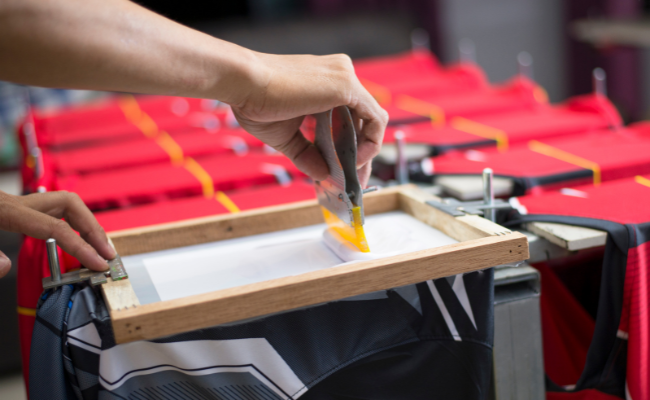Different Types of Shirt Printing
Welcome to the world of T-shirt printing, an arena of creativity that has revolutionized the apparel industry. With various printing methods and fabrics available, this field provides unlimited possibilities for artistic expression. Whether you’re an aspiring T-shirt designer or a small business owner, understanding these techniques is crucial for success in this digital era of self-expression and personal branding.
In this guide, we’ll dive into the different T-shirt printing methods, explore the most suitable fabric types, and shed light on prepared-for-dyeing (PFD) shirts, which are an essential part of the printing process. Get ready to unlock the secrets to creating exceptional designs that captivate your audience and elevate your brand.
What Are the Different Types of T-shirt Printing Options?
 If you’re starting a T-shirt business, you must have heard of screen printing. While this is the most common option, there are also other printing processes that might suit your budget. Let’s discuss some of them in this section.
If you’re starting a T-shirt business, you must have heard of screen printing. While this is the most common option, there are also other printing processes that might suit your budget. Let’s discuss some of them in this section.
Screen Printing
Screen printing is one of the oldest and most widely used methods for printing designs onto T-shirts. This technique involves creating a stencil (or screen) for each color in the design and then applying ink through the screens onto the fabric. The ink is pressed into the fabric, resulting in vibrant, long-lasting prints. Here are the key aspects of screen printing:
Process: First, a design is transferred onto a mesh screen, and areas that are not part of the design are blocked. Ink is then pressed through the screen onto the T-shirt using a squeegee, creating the desired design.
Pros
- Ideal for high-volume printing due to its efficiency and cost-effectiveness
- Offers vibrant colors and excellent color saturation
- Durable and long-lasting prints that can withstand multiple washes
Cons
- Limited color options per design due to the requirement for separate screens
- Not suitable for intricate or highly detailed designs
- Set-up time and costs can be higher than other methods
Direct-to-Garment (DTG) Printing
DTG printing has revolutionized the T-shirt printing industry, enabling high-quality, full-color designs without the need for screens. This method utilizes specialized inkjet printers that directly apply water-based ink onto the fabric. Let’s explore this process further:
Process: The T-shirt is loaded onto the printer, and the printer prints the design onto the fabric using specialized inks. The fabric fibers absorb the ink, resulting in a soft and comfortable feel.
Pros
- Unlimited color options and the ability to print intricate designs with fine details
- Excellent color accuracy and shading
- Suitable for printing on-demand or small quantities
Cons
- Slower production time compared to screen printing for larger quantities
- Prints may not be as durable as screen printing, particularly on dark-colored garments
- Higher cost per unit for larger quantities
Heat Transfer Printing
Heat transfer printing involves transferring a design onto the fabric using heat and pressure. This method is commonly used for personalized or custom prints. Let’s take a closer look:
Process: The design is printed onto transfer paper using special inks or vinyl. Heat and pressure are applied to transfer the design from the paper onto the T-shirt, creating a permanent bond.
Pros
- Can print complex designs, including photographs and gradients
- Suitable for small quantities and one-off prints
- Quick and easy process with minimal setup requirements
Cons
- Limited durability compared to screen printing
- Can feel stiff or rubbery, depending on the transfer material used
- Not as cost-effective for large-scale printing
Fabric Types: A Key Consideration in T-shirt Printing

Cotton
Cotton is a classic choice in the world of T-shirt printing. Many in the business cherish cotton for its softness, breathability, and ability to absorb moisture. It provides a comfortable and natural feel against the skin, making it a preferred option for those seeking everyday wear.
Cotton fabrics are generally more affordable than their counterparts, offering cost-effective solutions for mass production. However, one drawback of cotton is its tendency to shrink after washing, which may affect the size and fit of the printed T-shirt.
Polyester
Polyester fabrics have gained popularity due to their durability, resistance to wrinkles, and vibrant color retention. These characteristics make them suitable for sports apparel and sublimation printing, where durability and vivid graphics are paramount.
Polyester fabrics are also popular for their quick-drying properties, making them ideal for athletic activities. However, some individuals may find polyester less breathable compared to natural fibers, leading to discomfort in certain climates.
Blended Fabrics
Blended fabrics are typically a combination of cotton and polyester, offering the best of both worlds. Blending the two materials means wholesale T-shirt manufacturers can take advantage of cotton’s comfort and polyester’s durability.
Blended fabrics often exhibit enhanced wrinkle resistance and color retention, making them suitable for various printing techniques. It is important to note that the characteristics of the fabric will vary depending on the specific blend ratio.
The Power of Prepared-For-Dyeing (PFD) Shirts with Spectra USA
When it comes to T-shirt printing, one term that you may come across is “Prepared-For-Dyeing” or PFD shirts. But what exactly are PFD shirts, and why do they matter?
PFD shirts are specially treated garments ready for dyeing, free from any pre-existing colors or patterns. They provide T-shirt designers and small business owners the ultimate creative freedom. Whether you seek vibrant, eye-catching designs or intricate patterns, PFD shirts are the ideal starting point.
Spectra USA, a leading manufacturer of high-quality blank apparel and wholesale T-shirts, offers a remarkable collection of PFD blanks designed specifically for T-shirt printing. With a commitment to quality and innovation, Spectra USA crafts their PFD shirts from top-notch materials, like 100% ringspun cotton, ensuring comfort, durability, and optimal printing results.
The benefits of using Spectra USA’s PFD blanks are noteworthy. Engineered to enhance the dyeing process, these shirts deliver vibrant, long-lasting colors that stay true to your original design. They offer excellent print clarity and color absorption, allowing for the accurate reproduction of intricate details and gradients on the fabric.
Spectra USA’s PFD blanks are an affordable voice as they are available at wholesale prices. With a wide range of styles and sizes, you can find the perfect fit for your target audience.
Conclusion
T-shirt printing is an art, and like any other art, it requires the right tools and techniques. From understanding different printing methods to choosing the right fabric and prepared-for-dyeing shirts, each step plays a vital role in the outcome.
The power of PFD shirts, particularly those offered by Spectra USA, is undeniable in creating quality, vibrant, and durable prints. As you embark on your T-shirt printing journey, equipped with this knowledge, you’re one step closer to creating standout designs. Let your creativity flow and happy printing!
Ready to start your T-shirt printing journey? Check out Spectra USA’s collection of high-quality PFD shirts.

